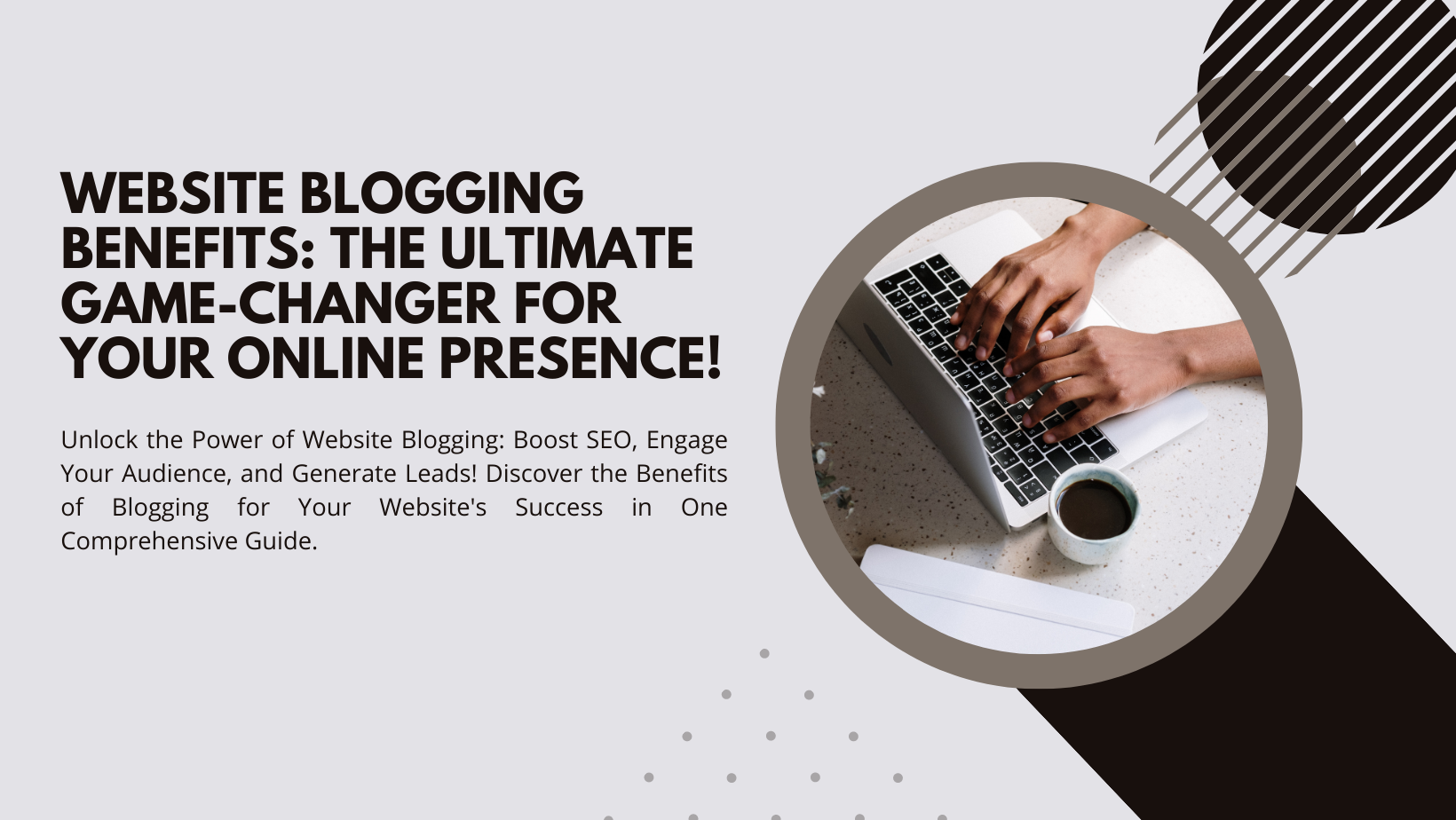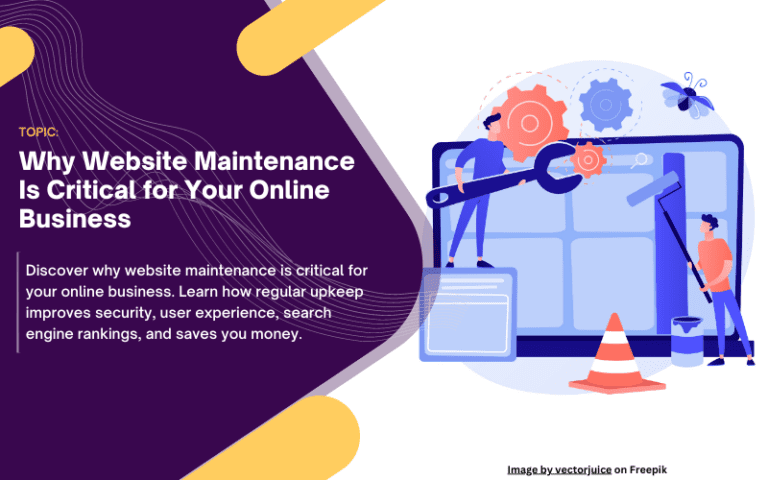Website Blogging Benefits: The Ultimate Game-Changer for Your Online Presence!
Website blogging has become a fundamental aspect of online presence and growth. In today’s digital landscape, businesses and individuals alike can’t afford to overlook the benefits that come with maintaining a blog. By incorporating a blog into your website, you can enhance your online visibility, establish authority in your industry, engage with your audience, generate leads, and much more. In this comprehensive guide, we will explore the various advantages of website blogging and why it’s essential for the success of your online presence.
Why Your Website Needs a Blog to Thrive?
1. Boosting Search Engine Optimization (SEO)

To thrive in the highly competitive online world, it’s crucial to have a strong presence in search engine results. By consistently publishing high-quality blog content, you can boost your website’s SEO efforts. Search engines love fresh, relevant content, and a blog is the perfect platform to regularly deliver that. With each well-optimized blog post, you increase your chances of ranking higher in search engine results pages, driving organic traffic to your website. Here are the key ways in which blogging can boost your SEO:
- Increased website visibility: By regularly publishing fresh and valuable blog posts, you provide search engines with new content to crawl and index, increasing the visibility of your website.
- Improved search engine rankings: Optimizing your blog posts with relevant keywords and providing high-quality content can help improve your website’s rankings in search engine results.
- Enhanced keyword targeting: Through keyword research and strategic use of keywords in your blog posts, you can target specific search queries and attract more relevant organic traffic to your website.
- Increased backlinks and authority: Well-crafted blog content can attract backlinks from other websites, indicating to search engines that your website is reputable and authoritative in your industry.
- Better user experience: Blogging allows you to provide valuable information and engage with your audience, leading to longer dwell times, lower bounce rates, and improved user experience signals that positively impact SEO.
- Social media promotion: Blogging gives you content to share on social media platforms, driving traffic back to your website and potentially increasing your website’s visibility and reach.
- Long-term value: Blog posts have the potential to generate ongoing organic traffic over time, as they remain accessible and searchable on your website.
Incorporating a blog into your website and implementing effective SEO strategies can significantly enhance your online presence, increase visibility, and attract more organic traffic. By consistently providing valuable content and optimizing it for search engines, you can achieve higher rankings, reach a wider audience, and ultimately drive the success of your website.
2. Establishing Authority and Credibility

In the vast online landscape, establishing authority and credibility is paramount. A blog allows you to showcase your expertise in your industry. By sharing valuable insights, industry news, and expert opinions, you position yourself as a thought leader. This, in turn, builds trust with your audience and strengthens your brand reputation. Providing accurate and insightful content through your blog helps you stand out from competitors and establishes you as a reliable source of information. Here’s how blogging helps in this regard:
- Demonstrating expertise: Consistently producing high-quality blog posts that provide valuable information and insights demonstrates your knowledge and expertise in your industry. This helps build trust and credibility with your audience.
- Sharing industry insights: Use your blog to share industry trends, analysis, and expert opinions. By providing unique and valuable perspectives, you position yourself as a thought leader in your field.
- Building a loyal community: Engaging with your readers through your blog fosters a sense of community and establishes a two-way communication channel. Responding to comments and encouraging discussions further enhances your authority and credibility.
- Showcasing accomplishments: Use your blog to highlight your achievements, such as awards, certifications, or notable projects. This allows you to showcase your expertise and accomplishments to your audience, further establishing your credibility.
- Guest blogging and collaborations: Collaborating with other industry experts and guest blogging on reputable websites allows you to tap into new audiences and further enhance your authority and credibility. By associating yourself with other respected voices in your industry, you can solidify your position as an authority.
By consistently producing valuable and insightful blog content, engaging with your audience, and collaborating with other industry experts, you can establish authority and credibility in your field. This helps build trust with your audience, attract new visitors to your website, and position yourself as a go-to resource in your industry.
3. Engaging and Connecting with Your Audience

One of the greatest advantages of having a blog is the ability to engage and connect with your audience on a deeper level. By creating valuable and informative content that resonates with your target audience, you encourage them to interact with your brand. Incorporating calls to action, inviting comments and feedback, and actively responding to your readers’ inquiries fosters a sense of community and loyalty. Additionally, social sharing buttons allow your audience to spread the word about your content, driving more traffic to your website. Here’s how blogging helps in engaging and connecting with your audience:
- Encouraging interaction: A blog allows for direct interaction with your audience through comments and feedback. Responding to comments and actively engaging in discussions demonstrates your interest in their opinions and builds a sense of community.
- Providing valuable content: By consistently publishing valuable and informative blog posts, you establish yourself as a reliable source of information. This encourages readers to return to your blog, creating a loyal audience base.
- Understanding audience needs: Through blog analytics and comments, you gain insights into the interests, preferences, and pain points of your audience. This information helps you tailor future blog posts to better serve their needs and interests.
- Sharing personal stories: Blogging allows you to share personal experiences, stories, and anecdotes. This helps humanize your brand and fosters a deeper connection with your audience. By showing vulnerability and authenticity, you can build trust and loyalty.
- Encouraging social sharing: Engaging blog content is more likely to be shared on social media platforms, expanding your reach and attracting new readers. Encourage social sharing by including social media buttons and calls-to-action in your blog posts.
- Building an email subscriber list: Use your blog to encourage readers to subscribe to your email list. By offering exclusive content, updates, or incentives, you can grow your email subscriber base and establish a direct line of communication with your audience.
- Collaboration and guest contributions: Collaborating with industry experts and featuring guest contributions on your blog allows you to tap into their audience and foster connections with new readers. It also provides fresh perspectives and diverse voices to enhance the value you offer.
By consistently engaging with your audience, providing valuable content, and fostering connections, your blog becomes a platform for building relationships and creating a loyal community. This leads to increased audience retention, word-of-mouth referrals, and a stronger online presence.
4. Generating Leads and Converting Customers

A well-structured blog can serve as a powerful lead-generation tool. By incorporating opt-in forms and subscription options throughout your blog, you can capture valuable leads. These leads can then be nurtured through email marketing campaigns, allowing you to build relationships and guide potential customers through the buyer’s journey. With persuasive and informative blog posts, you can educate your audience about your products or services, increasing the chances of conversions and sales. Let’s explore some additional strategies to maximize the effectiveness of your blog in generating leads and driving conversions:
- Implement lead magnets: In addition to opt-in forms and subscription options, consider creating lead magnets as incentives for visitors to provide their contact information. Lead magnets can be in the form of e-books, whitepapers, checklists, or exclusive content that addresses a specific pain point or offers valuable insights. By offering these valuable resources, you can entice visitors to exchange their email addresses for the content.
- Segment your email list: As you capture leads through your blog, segment your email list based on their interests, demographics, or behavior. This allows you to send targeted and personalized emails that cater to their specific needs and preferences. By tailoring your messages, you increase the chances of engaging your leads and nurturing them toward conversion.
- Offer product demos or trials: If your blog focuses on promoting specific products or services, consider offering free trials or demos to your leads. This gives them a firsthand experience of the value your offerings provide. By showcasing the benefits and features of your products or services, you can build trust and increase the likelihood of conversion.
- Use persuasive call-to-action (CTA) buttons: Within your blog posts, strategically place persuasive CTA buttons that lead visitors to relevant landing pages or product pages. Ensure that your CTAs are clear, compelling, and encourage action. Experiment with different wording, colors, and placement to optimize click-through rates and conversions.
- Leverage social proof: Incorporate social proof elements within your blog posts to build credibility and trust with your audience. Display testimonials, case studies, or reviews from satisfied customers to showcase the positive experiences others have had with your products or services. This helps potential customers feel more confident in making a purchasing decision.
- Utilize retargeting campaigns: Implement retargeting campaigns to re-engage blog visitors who have shown interest but haven’t converted. By using tracking pixels or cookies, you can display targeted ads to these visitors across other websites or social media platforms. Retargeting keeps your brand top of mind and increases the chances of bringing back interested leads to your blog for conversion.
- Continuously analyze and optimize: Regularly review the performance of your lead generation efforts and conversion rates. Use analytics tools to track key metrics such as click-through rates, conversion rates, and email engagement. Analyze the data to identify areas for improvement, test different strategies, and refine your blog content, CTAs, and email campaigns.
By implementing these strategies, you can effectively leverage your blog as a lead generation and conversion tool. Building relationships with your audience, providing valuable content, and optimizing the user journey from lead to customer increases the chances of generating qualified leads and driving conversions. Remember to consistently monitor and adapt your approach to align with the changing needs and preferences of your target audience.
5. Showcasing Products or Services
Your blog provides an excellent platform to showcase your products or services. By creating dedicated blog posts that highlight their features, benefits, and success stories, you can effectively demonstrate the value they bring. Furthermore, you can engage your audience with product comparisons, recommendations, and how-to guides. By strategically integrating product-focused content into your blog, you can drive traffic to your sales pages and boost conversions.
6. Building a Network and Collaborating
In the digital landscape, building connections and collaborations is crucial for growth. Your blog can act as a catalyst for networking opportunities. By reaching out to influencers and industry leaders, you can build relationships that may lead to guest posting opportunities or collaborative projects. Collaborating with other businesses not only expands your reach but also allows for mutual growth and cross-promotion. By actively engaging with your industry peers through your blog, you position yourself as a valuable player in your niche.
7. Enhancing Social Media Presence

Social media is an integral part of modern marketing strategies, and your blog can significantly contribute to enhancing your social media presence. By creating shareable content, embedding social media sharing buttons, and actively promoting your blog posts on platforms like Facebook, Twitter, and LinkedIn, you can drive more traffic to your website. Increased social media visibility leads to brand awareness, engagement, and the potential to attract new audiences.
8. Providing Customer Support and Education
Your blog can be a valuable resource for providing customer support and education. By addressing common questions, concerns, and challenges faced by your customers, you can offer solutions and guidance through informative blog posts. Additionally, tutorials, how-to guides, and a comprehensive knowledge base can empower your customers and enhance their experience with your products or services. By being a reliable source of information, you solidify customer loyalty and trust.
9. Monetizing Your Website
Running a successful blog can open up various opportunities for monetization. By incorporating advertisements, such as Google AdSense, you can generate income based on the traffic your blog receives. Additionally, affiliate marketing enables you to promote products or services related to your niche and earn a commission on each sale. Moreover, you can create and sell digital products, such as e-books or online courses, leveraging your blog’s reputation and readership.
What is Website Blogging?

Website blogging refers to the practice of regularly creating and publishing written content on a specific area of interest or expertise on a website. It involves the use of a blog as a platform to share informative articles, insights, opinions, and other relevant content with a targeted audience.
A blog typically consists of a series of individual posts or articles arranged in reverse chronological order, with the most recent content appearing at the top. Each blog post focuses on a specific topic or theme related to the overall subject of the blog.
The purpose of website blogging varies depending on the goals of the website owner or organization. Some common objectives of blogging include:
- Providing valuable information: Blogs serve as a means to educate, inform, and entertain readers. They offer a platform to share insights, tutorials, guides, news, and other forms of helpful content that address the interests and needs of the target audience.
- Engaging with the audience: Blogging encourages interaction and engagement with readers through comments, social media sharing, and other forms of feedback. It creates an opportunity for dialogue, enabling readers to ask questions, share their opinions, and connect with the author or website owner.
- Establishing authority and credibility: A well-maintained blog allows individuals or businesses to showcase their expertise, knowledge, and thought leadership in a particular industry or niche. By consistently delivering valuable content, bloggers can build a reputation as trusted sources of information and establish themselves as authorities in their respective fields.
- Enhancing search engine visibility: Blogging plays a significant role in search engine optimization (SEO) by providing fresh and relevant content that search engines can index. When blog posts are optimized with targeted keywords and structured in a search engine-friendly manner, they can contribute to higher search rankings and increased organic traffic to the website.
- Driving website traffic and conversions: Blogging can attract new visitors to a website, potentially leading to increased brand exposure and customer acquisition. By including calls to action within blog posts or utilizing strategic internal linking, bloggers can guide readers towards desired actions such as subscribing to a newsletter, making a purchase, or filling out a contact form.
Overall, website blogging serves as a powerful tool for individuals, businesses, and organizations to communicate, share knowledge, engage with their audience, and achieve their online objectives. It offers an effective way to establish an online presence, build relationships, and drive the success of a website or brand.
How do I create a blog on my website?

Creating a blog on your website is an effective way to share valuable content, engage with your audience, and boost your online presence. Here’s a comprehensive guide on how to create a blog on your website:
- Choose a blogging platform: Start by selecting a suitable blogging platform that aligns with your needs and technical expertise. Popular options include WordPress, Blogger, and Squarespace. Consider factors such as ease of use, customization options, and available features.
- Purchase a domain and hosting: To have full control over your blog, register a domain name that reflects your brand or niche. Next, choose a reliable web hosting provider to ensure your website remains accessible and performs well.
- Install a content management system (CMS): If you’ve chosen WordPress as your blogging platform, install it on your hosting account. Many hosting providers offer one-click WordPress installations, making the setup process simple and convenient.
- Customize your blog’s appearance: Choose a visually appealing theme that represents your brand and enhances the user experience. Customize the theme by adding your logo, adjusting colors and fonts, and organizing the layout to make it user-friendly.
- Set up essential pages: Create essential pages such as the About page, Contact page, and Privacy Policy page. These pages provide important information about your blog and enable visitors to connect with you.
- Configure blog settings: Access the settings in your blogging platform’s dashboard to configure important options such as permalinks, comment settings, and SEO settings. Optimize these settings to enhance your blog’s visibility and user experience.
- Plan your blog content: Develop a content strategy by identifying your target audience, determining the topics you want to cover, and planning a content calendar. This helps you stay organized and ensures a consistent flow of valuable content.
- Create compelling blog posts: Start creating blog posts by conducting thorough research on your chosen topic. Craft engaging and informative content that provides value to your readers. Use a mix of text, images, and other media to enhance the visual appeal and readability of your blog posts.
- Optimize your blog for SEO: Implement SEO best practices to improve your blog’s visibility in search engine results. This includes conducting keyword research, optimizing meta tags, using descriptive headings, and building internal and external links.
- Promote your blog: Share your blog posts on social media platforms, join relevant online communities, and engage with other bloggers in your industry. Actively promote your content to attract readers, increase visibility, and expand your reach.
- Engage with your audience: Encourage readers to leave comments on your blog posts and respond to their feedback and questions. Foster a sense of community by initiating conversations and building relationships with your audience.
- Analyze and refine: Regularly analyze your blog’s performance using analytics tools. Monitor metrics such as traffic, engagement, and conversion rates to gain insights into what works and refine your blogging strategy accordingly.
By following these steps, you can successfully create a blog on your website and leverage its potential to connect with your audience, share valuable content, and grow your online presence. Remember to consistently provide high-quality content, engage with your readers, and adapt your strategy based on audience feedback and analytics data.
Conclusion: Unleash the Potential of Website Blogging
With its multitude of benefits, website blogging has become an indispensable tool for online success. From boosting SEO to establishing authority, engaging with your audience, generating leads, and monetizing your website, a well-crafted blog can unlock tremendous potential. Whether you’re a business or an individual looking to thrive in the online world, embracing website blogging is an essential step towards achieving your goals. Start or optimize your blog today, and witness the transformative power it can have on your online presence.
Frequently Asked Questions (FAQ)
Related Posts
- Why Website Maintenance Is Critical for Your Online Business: Learn why website maintenance is crucial for your online business.
- 11 Common Website Design Mistakes to Avoid: Discover the common website design mistakes to steer clear of.
- The Benefits of Responsive Web Design for Your Website: Explore the advantages of responsive web design for your website.
- How to Choose the Right Web Design Agency for Your Business?: Find out how to select the perfect web design agency for your business.
- 5 Essential Elements of a Successful Website Design: Uncover the key elements that make a website design successful.







